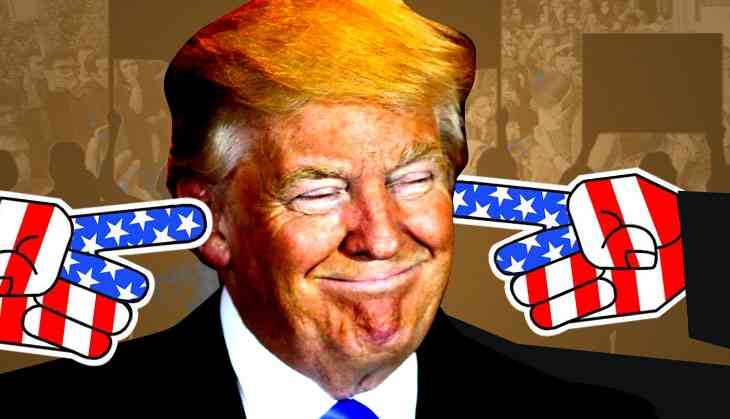Is Trump Listening to Iranians?

In 2013, hundreds of Iranian dissidents warned in a letter to President Obama that, “We are deeply concerned about the recurrence of the Iraqi experience for Iran, which would eliminate the only opportunity for peaceful and democratic change in our country. We are certain that economic sanctions will continue to weaken Iran’s civil society and strengthen the hands of extremists.” In the same year, American sanctions crippled Iran’s middle class and businesses in the private sector, but it contributed to the economic and political empowerment of the hardline Islamic Revolutionary Guards Corps.
Today, five years later, the Trump administration is preparing to re-impose sanctions on Iran, in the hope that they will create social turmoil, and bring Iranians back in the streets. However, unlike what the hawks think in Washington and in Tel-Aviv, the deterioration of Iran’s economy combined with the weakening of the middle class will end up contributing to the disempowerment of the Iranian civil society and solidification of the power of the ruling elite. However, it is true that the sanctions also led Iranians in 2013 to elect President Hassan Rouhani, who pledged to sign a nuclear deal with Americans and Europeans in order to lift the burden on Iran’s economy.
The 2015 nuclear deal was largely supported by the Iranian middle class and the dissidents, because it opened the prospect of lifting sanctions and helping the Iranian economy, to get back to normal. Iran’s first priority after the sanctions were lifted in January 2016 was to boost its oil exports and restore its share of OPEC production. As such, Iran’s oil exports increased from 1.4 million barrels per day in February 2014 (under sanctions) to 2.2 million barrels per day in August 2017. Petrochemical exports also increased in the first seven months of 2017, but their growth was overshadowed by Iran’s trade with the European Union. After the relief of the sanctions, Iran increased its trade with European countries, including France, Germany and Italy.
As a result, Germany became the sixth largest exporter to Iran in 2017. After the re-election of Rouhani to a second term, the French oil company Total and the Chinese state-owned oil and gas company CNPC partnered with the Iranian state-owned company Petropars in a five-billion-dollar contract to develop phase 11 of the South Pars (offshore) gas field.
This twenty-year deal was expected to produce two billion cubic feet of gas (400,000 barrels of oil equivalent) per day starting in 2021. Today, with the new sanctions imposed by the Trump officials, Total’s stake in this project is at risk. The French energy major has affirmed that it would abandon the multi-billion dollar gas field development project in the Persian Gulf unless it can secure a waiver from Washington sanctions. Let us not forget that Iran has the second-largest gas reserves and fourth-largest oil reserves in the world. However, the Chinese CNPC is willing to purchase the 50.1% stake held by Total in the Phase 11 development project covering part of the South Pars gas field off Iran’s Persian Gulf coast.
The Trump administration has largely nullified Iranian hopes to attract an average of $20 billion per year in foreign direct investment (FDI) in order to meet its basic economic needs. Nearly a year ago, Iran’s Foreign Investment Board (FIB) had approved 26 FDI projects worth $885.8 million. This was followed by the approval of 36 projects worth $3.012 billion during August–October 2017. That said, last January's protests demonstrated clearly that a big segment of Iran’s population does not feel any tangible improvement in their economic conditions despite the economic growth since the nuclear agreement of 2015.
Therefore, three years since the implementation of the Joint Comprehensive Plan of Action (JCPOA), the economic dividends of the nuclear deal have not led to a tangible improvement in the day-to-day economic situation of many Iranian households.
Washington’s withdrawal from the JCPOA would definitely reinstate pressures on Tehran, and weaken the economic situation of the Iranian population. But the weaker Iran’s middle class grows, the less organized it will become.
So, unlike Trump’s expectations, the new sanctions imposed by the U.S. might push Iranians to become more anti-American. In the meantime, the Iranian government will detail plans to increase its reliance, on China and Russia. Also, the EU courts are trying to find ways to rule against sanctions on Iranian banks. The European Commission adopted Wednesday an update of the Blocking Statute, a 1996 regulation that allows EU companies to dodge US extraterritorial sanctions. It added to the regulation's scope sanctions the US would impose on EU companies that do business with Iran after the US pulled off the Iran nuclear deal.
The EU executive also modified the European Investment Bank's mandate to allow it to support projects in Iran. Even assuming that the Trump administration is preparing prospective strategies for weakening and ultimately removing the theocratic establishment in Iran, the psychological component of this plan should not meet a significant resistance from the Iranian population. After all, it shouldn’t be so difficult for the Trump administration to hear what the ordinary Iranians have to say in order not to repeat the errors of the Iraqi adventure. In 2003 the Bush administration got involved in an adventure that destroyed the Iraqi dream of democracy.
Today, the Trump administration is destroying another dream, that of Iran’s middle class, which is to rebuild a democratic Iran which is not politically disorganized and economically crippled by years of economic sanction and social turmoil.

